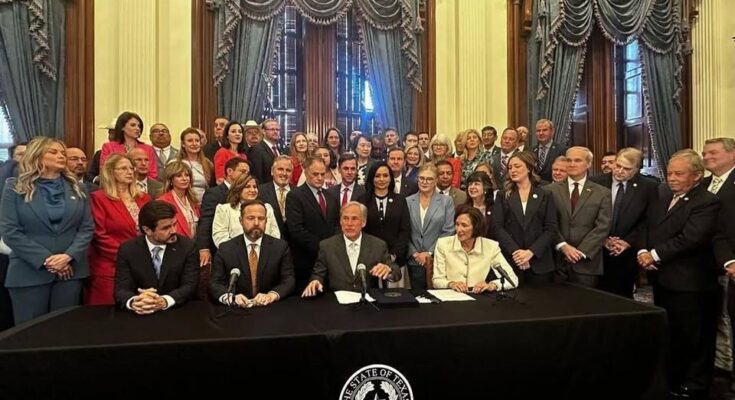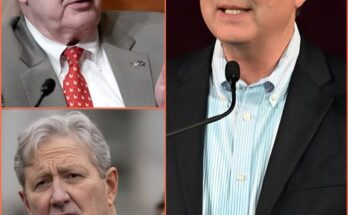
A Bold Move from Texas
In a move that has shaken the political landscape, Governor Greg Abbott of Texas took a step that many considered unthinkable in modern American politics. On a day that will likely be remembered in history, Abbott officially labeled the Muslim Brotherhood and the Council on American-Islamic Relations (CAIR) as foreign terrorist organizations. This landmark decision marks a significant turning point in how the United States handles foreign influence and extremist ideologies within its borders.
Governor Abbott’s decision has sparked widespread debate, drawing sharp reactions from both supporters and detractors. For some, this move is seen as a courageous act of national security, a long-needed stance against organizations that have been linked to extremist activities. For others, it is an overreach that jeopardizes civil liberties and fosters division. But regardless of where one stands on the issue, Abbott’s move undeniably signals a shift in how Texas—and perhaps the entire nation—will handle the intersection of foreign ideologies and domestic security.
The Decision: What Did Governor Abbott Do?
Governor Greg Abbott’s declaration has caused ripples across the political spectrum. On that fateful day, Abbott became the first governor in the United States to directly label the Muslim Brotherhood and CAIR as foreign terrorist organizations. This unprecedented action has far-reaching consequences, not just for Texas, but for the entire country.
At its core, Abbott’s move bans these organizations from owning any land in Texas. This is a sharp and decisive action aimed at limiting their influence within the state. For those who have been following Abbott’s political career, this is in line with his strong stance on border security and national sovereignty. Texas, under Abbott’s leadership, has always been at the forefront of defending what he sees as the fundamental values of the United States, and this decision marks the latest chapter in that story.
What makes this decision particularly significant is the fact that it is the first time a U.S. governor has taken such an explicit stance against these organizations. By invoking the power of the RICO Act, Abbott has essentially placed these entities under the same legal scrutiny as organized crime syndicates.
The Legal and Political Impact: Consequences of the Decision
Governor Abbott’s move to label the Muslim Brotherhood and CAIR as terrorist organizations is not just a political statement—it has serious legal ramifications. Under U.S. law, being designated as a foreign terrorist organization comes with a host of consequences, including the prohibition of property ownership, the freezing of assets, and the restriction of business operations. By taking this step, Abbott has ensured that these organizations can no longer influence Texas’ political and economic landscape in the same way they have in the past.
But the political consequences extend beyond Texas’ borders. This move challenges the very fabric of American political discourse, as it pits national security against civil rights. Many critics argue that Abbott’s decision sets a dangerous precedent by stoking fear and division. They contend that such actions could lead to the marginalization of entire communities based on their religious or political affiliations.
On the other hand, supporters of Abbott’s decision argue that this is a necessary step in the fight against extremism. They point to the ties between organizations like CAIR and terrorist groups such as Hamas and the Muslim Brotherhood’s long history of supporting radical ideologies. For these individuals, Abbott’s decision is seen as a bold move to protect the state—and the nation—from the growing threat of jihadist extremism.

No bold political decision is without its critics, and Abbott’s stance on the Muslim Brotherhood and CAIR is no exception. The backlash has been swift and vocal, particularly from civil rights groups like CAIR, which immediately condemned the decision as Islamophobic and discriminatory. They argue that Abbott’s move unfairly targets the Muslim community and paints them with the same brush as violent extremists.
These criticisms have sparked an intense public debate, with some arguing that Abbott’s actions represent an overreach of government power. They warn that labeling groups as terrorist organizations based on their political or religious affiliations could set a dangerous precedent, one that could be used to target other communities in the future.
On the other hand, there are those who support Abbott’s decision wholeheartedly, arguing that the fight against terrorism requires such decisive actions. They point to the dangers posed by groups like CAIR, which they claim have close ties to radical Islam and extremist elements within the Muslim world. For these supporters, Abbott’s decision is a necessary step to protect the safety and security of Texans and all Americans.
Texas’ Stance on Security and Sovereignty: A State of Defiance
Texas has long prided itself on its independent streak, and Governor Abbott’s decision reflects that deeply ingrained sense of sovereignty. By taking this action, Abbott is sending a clear message: Texas will no longer sit idly by while organizations that support extremism gain influence within its borders. Abbott’s Texas is one that stands firm in its commitment to national security and American values, and this decision is a testament to that.
Texas has also been a leading voice in the fight against illegal immigration, and this move is a logical extension of that broader stance on security. For Abbott, national security and sovereignty are non-negotiable, and this decision underscores his commitment to defending the state—and the nation—against external threats, both foreign and domestic.

Governor Greg Abbott’s decision to label the Muslim Brotherhood and CAIR as foreign terrorist organizations is a defining moment in American politics. It is a bold, controversial move that raises important questions about the balance between national security and civil liberties. While the decision has sparked heated debate, it also serves as a reminder that leadership sometimes requires making tough, unpopular choices in the name of protecting the greater good.
In the coming months and years, the impact of Abbott’s decision will continue to reverberate throughout the political landscape. Will other states follow suit, or will Abbott stand alone as the defender of Texas’ sovereignty? One thing is certain: Texas has drawn a line in the sand, and the political battle over this decision is far from over.




